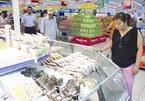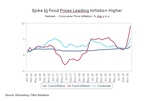 |
|
The Vietnamese dong would see just a slight devaluation against the US dollar, at around 2-3 per cent for the full year, according to Bao Viet Securities Corporation. — Photo vietnamfinance.vn
|
No other cash injections or withdrawals were conducted from the beginning of this year to January 20.
According to Bao Viet Securities Corporation, the central bank’s cash withdrawal aimed to control the money supply in the context that inflation pressure was increasing.
In a recent report, KB Viet Nam Securities forecast consumer price index (CPI) in February to expand at 5.11 per cent over the same period last year.
Inflation would be higher than the Government’s target (set at four per cent) at least in the first quarter of this year, the report wrote, adding that the room for the State Bank of Viet Nam to loosen the monetary policy in the short-term remained limited.
KB Securities predicted that the central bank would not have any moves to pump money in the first quarter to aid growth like other central banks in the region were doing to cope with heavy tolls caused by the outbreak of the novel coronavirus (COVID-19).
Entering the second quarter, the inflation pressure was forecast to cool off compared to the same period last year as pork prices would decrease.
The company forecast CPI to expand at 3.7 per cent on average in 2020.
On the inter-bank market, rates saw slight decreases for overnight loans, one-week and two-week loans by 0.3 percentage points, 0.2 percentage points and 0.3 percentage points to 2 per cent, 2.3 per cent and 2.32 per cent per year, respectively.
According to Bao Viet Securities Corporation, this indicated that the liquidity in the banking system had been abundant. The company forecast that the central bank would continue to withdraw cash in OMO market in the next few weeks.
The appreciation of the US dollar in the global market would continue to weigh on the exchange rate, coupled with the pressure from the development of the coronavirus epidemic, according to Bao Viet Securities. However, the company predicted that the Vietnamese dong would see just a slight devaluation against the US dollar, at around 2-3 per cent for the full year. — VNS

Money oversupply increases core inflation
Keeping the inflation rate at 4 percent in 2020 will be a challenging task, not only because of the pork price escalation, but also money excess.

Vietnam's credit growth to stabilise, inflation to be elevated In 2020: Fitch Solutions
Vietnam’s 2019 credit growth came in at just 12.1%, underperforming the State Bank of Vietnam (SBV)’s 14.0% target for the year. This marked a second year of deceleration since credit growth peaked at 18.2% in 2017.
 The State Bank of Vietnam made a net cash withdrawal worth VND86 trillion out of the economy through open market operations (OMO) from January 20 to February 14.
The State Bank of Vietnam made a net cash withdrawal worth VND86 trillion out of the economy through open market operations (OMO) from January 20 to February 14.